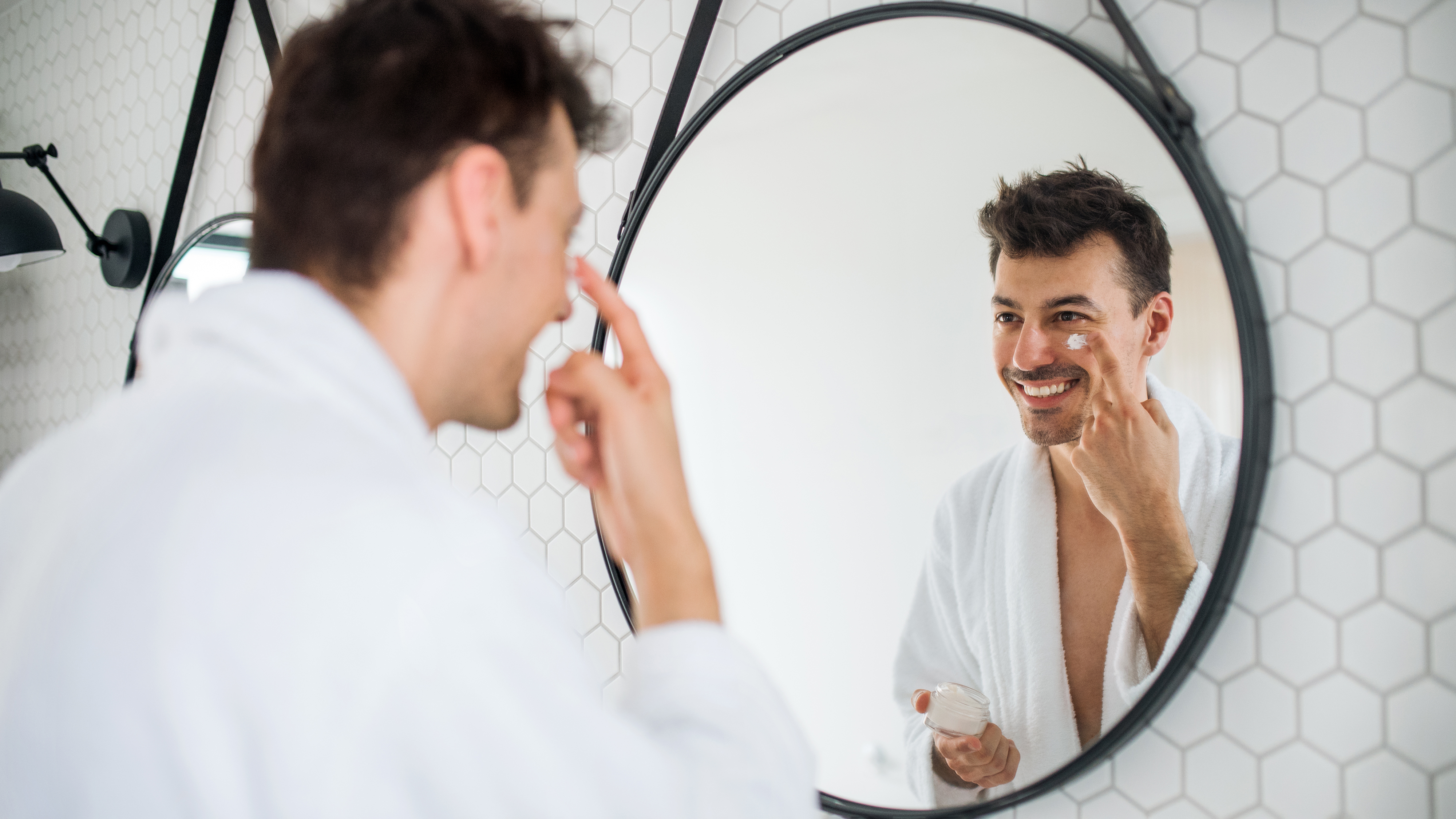What moisturisers should men use?
We find out which moisturisers are best for different skin types and problems

Get all the latest news, reviews, deals and buying guides on gorgeous tech, home and active products from the T3 experts
You are now subscribed
Your newsletter sign-up was successful
The benefits of using a moisturiser every day are palpable. You only have to check out our ‘7 reasons men should moisturise’ article to know that. However, picking the best type of moisturiser to best match your skin isn’t so easy.
According to Sara Waterman, Senior Aesthetician at Young LDN, when choosing a moisturiser, you must first look at your skin type; is it dry, normal, oily, sensitive or a combination of the above. Secondly, you must consider any conditions your skin currently has.
“Whereas your skin type is the normal state of your skin which changes with age, a skin condition can be a temporary state due to environment, health and cleansing habits (or lack of),” she says.
- Best moisturiser for men: creams for dry, oily, ageing, or sensitive skin
Therefore, this article will cover the number of common skin problems that men experience today and which types of moisturisers are best at combating them.
Skin problem 1: Dry skin
Many men experience dry skin, which is often caused by the decrease in the rate of sebum production.
Generally, men’s skin will start to become drier after the age of 30, and this will only become more aggravated by factors such as extreme weather and temperatures, air conditioning, central heating and pollutants in the atmosphere.
“Choosing a moisturiser that is gentle and alcohol-free is important for dry skin, plant oils can also help to feed the skin and reduce water loss,” explains Martin Kinsella from Re-enhance medical clinic, one of the UK’s leading anti-ageing cosmetic doctors. “Look for active ingredients that can increase long-term hydration too such as glycerin; a humectant that draws water to itself, hyaluronic acid and ceramides.”
Get all the latest news, reviews, deals and buying guides on gorgeous tech, home and active products from the T3 experts
Skin problem 2: Oily skin
On the other end of the spectrum to dry skin we have oily skin, which is very common in men due to them naturally having more oily skin than women. Nevertheless, this can be down to a variety of factors, from age and genetics, to enlarged pores, where you live, the time of the year and the fact you’re using the wrong skincare products.
“This is why choosing the right moisturiser is important,” says Kinsella. “A lot of people think that moisturiser can cause oily skin, but it can’t. In fact, if you’re using acne treatments such as salicylic acid you definitely need to use a good moisturiser to prevent it drying out.”
Therefore, a lightweight water-based moisturiser is ideal for oily skin.
“Make sure they’re oil-free and non-comedogenic, as this will help to keep pores clear,” he adds.
Skin problem 3: Acne
Acne is one of the most common skin conditions to affect men. Not only does it cause spots, oily skin and sometimes skin that's sore to the touch, but it can cause frustration and even depression for those that suffer from bad cases of it. There are a number of things that can cause acne; from clogged pores and hormone changes, to stress, medication, diet and lifestyle, however, choosing which moisturiser you use can have a massive impact.
“Avoid moisturisers that are too oily for the skin,” advises Kinsella “as this can exacerbate the acne.”
Instead, he suggests using an oil-free moisturiser as this is the key to controlling the oil production and removing dead skin.
“I always advise patients to have their hormone levels checked, too,” he adds. “This can be an easy way to spot irregularities that can then be addressed with medication. Simple steps can also be taken at home such as reducing the amount of processed foods, alcohol and sugar you include in your diet.”
Skin problem 4: Pigmentation
Pigmentation can be the major contributor to an uneven skin tone and thus the overall complexion of the skin. This can be the result of various issues such as hormonal imbalances (melasma), sun damage causing ageing and freckles, and brown spots (age spots). While these variations of skin colour are completely painless and the same texture as the rest of the skin, they can still affect the skin’s quality and overall appearance.
Because pigmentation is usually always caused by sun damage, Dr David Jack - a Harley Street skin specialist - recommends a moisturiser with a high concentration of vitamin C, as it’s a potent antioxidant that can help block melanin production and also act as a natural skin brightener.
“Vitamin C is one of the most studied, most evidence-based and most beneficial molecules in modern active skincare products,” Jack explains.
“The most active form, L-ascorbic acid, has multiple benefits in the skin including fibroblast activation (which increases collagen and elastin levels), regulation of pigmentation and (in combination with vitamin E) protection of the skin against future damage by UV rays.”
Jack recommends concentrations of 5-15% are ideal to get the antioxidant benefits but with low risk of irritation that you might get with higher concentrations.
Skin problem 5: Ageing
There’s no avoiding the ageing process and the wrinkles that come as part of that. However, we can help slow it down.
Ageing is caused by the depletion of collagen, the main protein in your body. Found in skin and connective tissues, it accounts for approximately one-third of your body’s protein and is particularly important because it supports your skin and provides a structure for it.
According to Kinsella, one of the easiest ways collagen is lost in the skin is through overexposure to the sun’s harmful rays.
“By incorporating an SPF into your skincare routine you can not only protect your skin from becoming damaged by these rays, but also protect it from collagen loss,” he says.
Therefore, it’s important to choose a moisturiser that has a high SPF value, ideally 50.
Louis Hayes Davies, Director at skincare brand Daimon Barber, says moisturisers with natural ingredients will also help guys who are concerned about fine lines and wrinkles.
“Look for a revitalising moisturiser that is fully charged with a plant extract like myramaze to help strengthen stressed skin, or filagrinol, which keeps skin moisturised as it’s a natural protein already made by the skin,” he advises.
“Also look for blends of oils to nourish the skin too like black seed, apple seed, lime seed oils that feed the skin and help with a healthy glow. Make it a routine and make it happen every day.”
Skin problem 6: Shaving irritation
Due to shaving, men can be prone to folliculitis, a common skin condition in which hair follicles become inflamed
In these cases, Esther Fieldgrass, owner and founder of EF MediSpa, recommends a lighter moisturiser in the form of a serum, especially one containing phytic acid.
“This [ingredient] works wonders for men suffering with folliculitis,” Fieldgrass says. “It’s perfect to use after shaving as it will help reduce the appearance of acne, breakouts and also tackle the early signs of ageing.
As a powerful natural antioxidant, phytic acid is a substance found in many plant-based foods. “It neutralises pollutants, regulates skin pigmentation and normalises sebum production, creating a healthy and balanced skin,” she adds.
Liked this?
- Best moisturiser for men: creams for dry, oily, ageing, or sensitive skin
- Best men's eye cream: fix the effects of a hectic lifestyle
- Best men's fragrances and colognes: long-lasting scents

Lee Bell is a freelance journalist and copywriter specialising in all things technology, be it smart home innovation, fit-tech and grooming gadgets. From national newspapers to specialist-interest titles, Lee has written for some of the world’s most respected publications during his 15 years as a tech writer. Nowadays, he lives in Manchester, where - if he's not bashing at a keyboard - you'll probably find him doing yoga, building something out of wood or digging in the garden.
